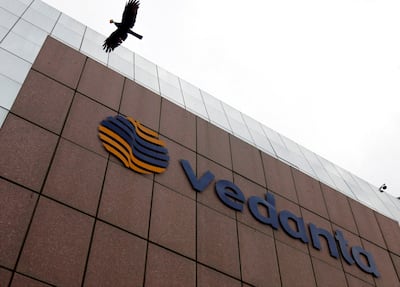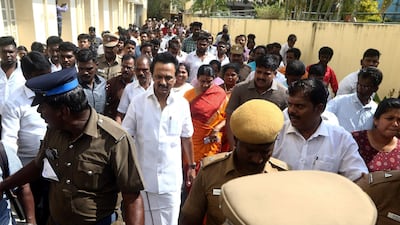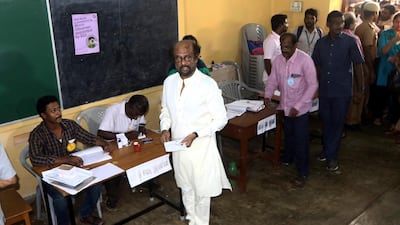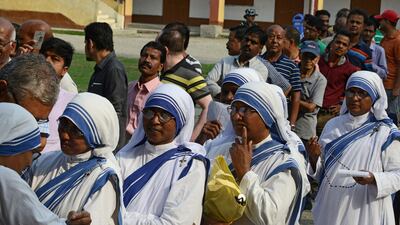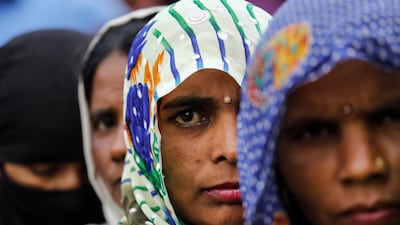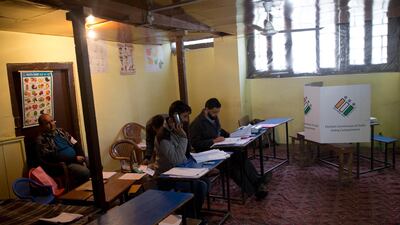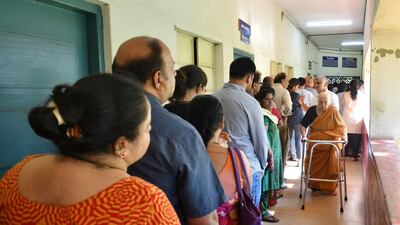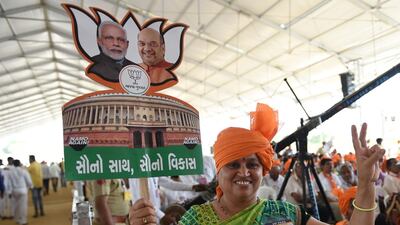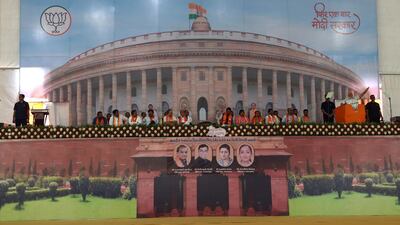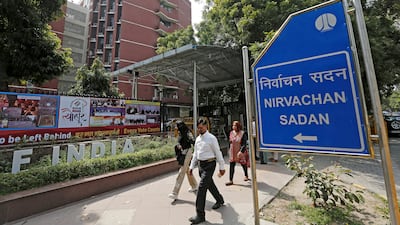India's ruling Bharatiya Janata Party has emerged as the biggest beneficiary of funds raised through a controversial electoral bonds programme, after the polling authority released the names of donors just weeks before national elections.
The BJP received 60 billion rupees ($723.8 million) of the total the scheme raised from donors, data released on Thursday by the Election Commission of India showed. The total funding amount was equal to $1.56 billion.
The biggest donors included Future Gaming and Hotel Services, a company under investigation by India's federal economic offences police over allegations of fraud and money laundering. Infrastructure company Megha Engineering and Qwik Supply Chain, a company having ties to billionaire Mukesh Ambani’s Reliance group, were also on the list of companies that funded political parties through the scheme.
The Election Commission released the donor data after the Supreme Court ruled the scheme was unconstitutional and breached the rights of voters.
Last month, the court struck down the scheme that allowed donors, including big companies, to buy electoral bonds from the State Bank of India to fund political parties without their names being made public.
The system introduced by Prime Minister Narendra Modi's government in 2017 allowed a person or company to buy bonds valued between 1,000 rupees and 10 million rupees from the bank. They can donate numerous bonds to a party registered with the Election Commission.
“It may be recalled that in the said matter, ECI [Election Commission of India] has consistently and categorically weighed in favour of disclosure and transparency, a position reflected in the proceedings of the Supreme Court and noted in the order also,” the commission said in a statement issued after publishing donor details on its website.
Top donor
Future Gaming and Hotel Services was the leading donor under the scheme. The company, owned by lottery magnate Santiago Martin, made political funding of 13.5 billion rupees through the scheme. Megha Engineering made the second-largest donation of 9.6 billion rupees, with Qwik Supply buying bonds worth 4.1 billion rupees.
It is still unclear which political party received the money, as the data released by the commission does not link donors to the recipients of their funding.
The Supreme Court on Friday asked the bank to disclose the unique alphanumeric numbers that will help to match donors with the parties they funded. The bank earlier told the court that it would take time to collate the necessary records and asked for three months to complete the process.
The data published by the commission comprised more than 40,000 entries and ran to about 800 pages. It showed 23 companies accounted for half the total value of electoral bonds purchased since April 2019.
Other donors included mining company Vedanta and the Serum Institute of India, the largest vaccine maker in the world. The institute was the main provider of shots for India during the Covid-19 pandemic.
Major groups such as telecom company Bharti Airtel, India’s largest private airline operator Indigo and real estate company DLF also made significant contributions to political parties, the data showed.
Steel magnate and billionaire Lakshmi Mittal made a personal contribution of 350 million rupees.
Critics of the programme said it lacked transparency and suggested donations could have been made in an attempt to influence policy decisions. The government has denied that claim and said the electoral bonds were meant to improve the political funding system and bring an end to cash donations.
Donor anonymity was meant to protect those who bought bonds, the government said.
Spending for support
Political parties in India spend billions of rupees in elections in an effort to secure the support of hundreds of millions of voters in the world’s largest democracy. National elections are set to be held in the coming weeks.
In the last elections in 2019, political parties spent 550 billion rupees, a report by the Centre for Media Studies found.
The government defended the electoral bonds scheme before the court, but a five-judge bench ruled on February 15 that the initiative was unconstitutional and warned it could encourage “quid pro quo arrangements” between parties and donors.
The ruling came after a years-long hearing on a petition submitted by the Association for Democratic Reforms, an independent election watchdog, and the Communist Party of India (Marxist).
India’s opposition political parties, including the Congress Party, welcomed the decision to end the scheme. The main opposition party received 142 billion rupees in funding, less than the All India Trinamool Congress, a regional party that controls the eastern state of West Bengal. It received 160 billion rupees, the second-highest total from the scheme.
It Was Just an Accident
Director: Jafar Panahi
Stars: Vahid Mobasseri, Mariam Afshari, Ebrahim Azizi, Hadis Pakbaten, Majid Panahi, Mohamad Ali Elyasmehr
Rating: 4/5
The specs
Engine: 4.0-litre V8
Power: 503hp at 6,000rpm
Torque: 685Nm at 2,000rpm
Transmission: 8-speed auto
Price: from Dh850,000
On sale: now
EA Sports FC 25
Developer: EA Vancouver, EA Romania
Publisher: EA Sports
Consoles: Nintendo Switch, PlayStation 4&5, Xbox One and Xbox Series X/S
Rating: 3.5/5
More from Neighbourhood Watch
Landfill in numbers
• Landfill gas is composed of 50 per cent methane
• Methane is 28 times more harmful than Co2 in terms of global warming
• 11 million total tonnes of waste are being generated annually in Abu Dhabi
• 18,000 tonnes per year of hazardous and medical waste is produced in Abu Dhabi emirate per year
• 20,000 litres of cooking oil produced in Abu Dhabi’s cafeterias and restaurants every day is thrown away
• 50 per cent of Abu Dhabi’s waste is from construction and demolition
Building boom turning to bust as Turkey's economy slows
Deep in a provincial region of northwestern Turkey, it looks like a mirage - hundreds of luxury houses built in neat rows, their pointed towers somewhere between French chateau and Disney castle.
Meant to provide luxurious accommodations for foreign buyers, the houses are however standing empty in what is anything but a fairytale for their investors.
The ambitious development has been hit by regional turmoil as well as the slump in the Turkish construction industry - a key sector - as the country's economy heads towards what could be a hard landing in an intensifying downturn.
After a long period of solid growth, Turkey's economy contracted 1.1 per cent in the third quarter, and many economists expect it will enter into recession this year.
The country has been hit by high inflation and a currency crisis in August. The lira lost 28 per cent of its value against the dollar in 2018 and markets are still unconvinced by the readiness of the government under President Recep Tayyip Erdogan to tackle underlying economic issues.
The villas close to the town centre of Mudurnu in the Bolu region are intended to resemble European architecture and are part of the Sarot Group's Burj Al Babas project.
But the development of 732 villas and a shopping centre - which began in 2014 - is now in limbo as Sarot Group has sought bankruptcy protection.
It is one of hundreds of Turkish companies that have done so as they seek cover from creditors and to restructure their debts.
Wicked: For Good
Director: Jon M Chu
Starring: Ariana Grande, Cynthia Erivo, Jonathan Bailey, Jeff Goldblum, Michelle Yeoh, Ethan Slater
Rating: 4/5
Day 1, Abu Dhabi Test: At a glance
Moment of the day Dimuth Karunaratne had batted with plenty of pluck, and no little skill, in getting to within seven runs of a first-day century. Then, while he ran what he thought was a comfortable single to mid-on, his batting partner Dinesh Chandimal opted to stay at home. The opener was run out by the length of the pitch.
Stat of the day - 1 One six was hit on Day 1. The boundary was only breached 18 times in total over the course of the 90 overs. When it did arrive, the lone six was a thing of beauty, as Niroshan Dickwella effortlessly clipped Mohammed Amir over the square-leg boundary.
The verdict Three wickets down at lunch, on a featherbed wicket having won the toss, and Sri Lanka’s fragile confidence must have been waning. Then Karunaratne and Chandimal's alliance of precisely 100 gave them a foothold in the match. Dickwella’s free-spirited strokeplay meant the Sri Lankans were handily placed at 227 for four at the close.
Killing of Qassem Suleimani
Usain Bolt's time for the 100m at major championships
2008 Beijing Olympics 9.69 seconds
2009 Berlin World Championships 9.58
2011 Daegu World Championships Disqualified
2012 London Olympics 9.63
2013 Moscow World Championships 9.77
2015 Beijing World Championships 9.79
2016 Rio Olympics 9.81
2017 London World Championships 9.95
JAPAN SQUAD
Goalkeepers: Masaaki Higashiguchi, Shuichi Gonda, Daniel Schmidt
Defenders: Yuto Nagatomo, Tomoaki Makino, Maya Yoshida, Sho Sasaki, Hiroki Sakai, Sei Muroya, Genta Miura, Takehiro Tomiyasu
Midfielders: Toshihiro Aoyama, Genki Haraguchi, Gaku Shibasaki, Wataru Endo, Junya Ito, Shoya Nakajima, Takumi Minamino, Hidemasa Morita, Ritsu Doan
Forwards: Yuya Osako, Takuma Asano, Koya Kitagawa
White hydrogen: Naturally occurring hydrogen
Chromite: Hard, metallic mineral containing iron oxide and chromium oxide
Ultramafic rocks: Dark-coloured rocks rich in magnesium or iron with very low silica content
Ophiolite: A section of the earth’s crust, which is oceanic in nature that has since been uplifted and exposed on land
Olivine: A commonly occurring magnesium iron silicate mineral that derives its name for its olive-green yellow-green colour
RESULTS
Argentina 4 Haiti 0
Peru 2 Scotland 0
Panama 0 Northern Ireland 0
MATCH INFO
Group B
Bayern Munich v Tottenham, midnight (Thursday)
Skoda Superb Specs
Engine: 2-litre TSI petrol
Power: 190hp
Torque: 320Nm
Price: From Dh147,000
Available: Now
The Buckingham Murders
Starring: Kareena Kapoor Khan, Ash Tandon, Prabhleen Sandhu
Director: Hansal Mehta
Rating: 4 / 5
What She Ate: Six Remarkable Women & the Food That Tells Their Stories
Laura Shapiro
Fourth Estate
Indian construction workers stranded in Ajman with unpaid dues
The specs: 2018 Jeep Grand Cherokee Trackhawk
Price, base: Dh399,999
Engine: Supercharged 6.2-litre V8
Gearbox: Eight-speed automatic
Power: 707hp @ 6,000rpm
Torque: 875Nm @ 4,800rpm
Fuel economy, combined: 16.8L / 100km (estimate)
The%20specs%20
%3Cp%3E%3Cstrong%3EEngine%3A%20%3C%2Fstrong%3E2.0-litre%204cyl%20turbo%0D%3Cbr%3E%3Cstrong%3EPower%3A%20%3C%2Fstrong%3E261hp%20at%205%2C500rpm%0D%3Cbr%3E%3Cstrong%3ETorque%3A%20%3C%2Fstrong%3E400Nm%20at%201%2C750-4%2C000rpm%0D%3Cbr%3E%3Cstrong%3ETransmission%3A%20%3C%2Fstrong%3E7-speed%20dual-clutch%20auto%0D%3Cbr%3E%3Cstrong%3EFuel%20consumption%3A%20%3C%2Fstrong%3E10.5L%2F100km%0D%3Cbr%3E%3Cstrong%3EOn%20sale%3A%20%3C%2Fstrong%3ENow%0D%3Cbr%3E%3Cstrong%3EPrice%3A%20%3C%2Fstrong%3EFrom%20Dh129%2C999%20(VX%20Luxury)%3B%20from%20Dh149%2C999%20(VX%20Black%20Gold)%3C%2Fp%3E%0A
ZAYED SUSTAINABILITY PRIZE
Why seagrass matters
- Carbon sink: Seagrass sequesters carbon up to 35X faster than tropical rainforests
- Marine nursery: Crucial habitat for juvenile fish, crustations, and invertebrates
- Biodiversity: Support species like sea turtles, dugongs, and seabirds
- Coastal protection: Reduce erosion and improve water quality
Profile Box
Company/date started: 2015
Founder/CEO: Mohammed Toraif
Based: Manama, Bahrain
Sector: Sales, Technology, Conservation
Size: (employees/revenue) 4/ 5,000 downloads
Stage: 1 ($100,000)
Investors: Two first-round investors including, 500 Startups, Fawaz Al Gosaibi Holding (Saudi Arabia)
